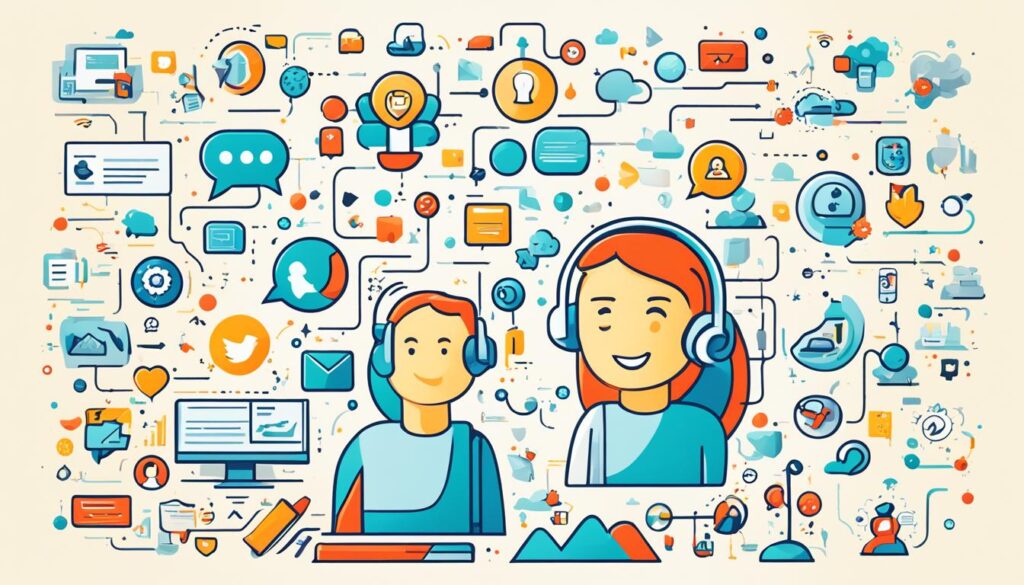In today’s competitive business landscape, providing exceptional customer service is more important than ever. But what exactly is customer service? In simple terms, customer service encompasses the support and assistance organizations offer to customers before and after they make a purchase. It’s about valuing every interaction with potential and existing customers, going above and beyond to ensure their satisfaction.
At its core, customer service is the bridge that connects an organization’s products or services with the people who use them. It’s the key to building strong customer relationships, fostering loyalty, and driving business growth.
Key Takeaways:
- Customer service involves providing support to customers before and after they purchase a product or service.
- It is about prioritizing customer satisfaction and valuing every interaction with customers.
- Customer service is crucial for building strong customer relationships and driving business growth.
- Exceptional customer service requires skills such as effective communication, problem-solving, and the ability to work well with customers and colleagues.
- Organizations utilize various tools and technologies to enhance their customer service and support operations.
The Role of Customer Service and Support
Customer service and support teams play a pivotal role in ensuring customer satisfaction. They serve as the bridge between the organization and its customers, providing valuable assistance and support throughout the customer journey. By delivering exceptional customer service, these teams contribute to customer retention and generate positive word-of-mouth referrals.
In today’s competitive business landscape, the importance of customer service cannot be overstated. It goes beyond resolving customer issues; it encompasses building lasting relationships based on trust and reliability. Effective customer service sets businesses apart from their competitors and establishes a strong reputation in the market.
Customer service encompasses a wide range of skills and responsibilities. Customer service representatives should possess in-depth knowledge about the organization, its products, and its services. This allows them to provide accurate and relevant information to customers, ensuring a seamless experience.
Active listening is another vital skill for customer service professionals. By empathetically listening to customer concerns, they can identify the root cause of the problem and provide timely solutions. Effective communication is equally important, as it enables representatives to convey information clearly and professionally.
Problem-solving is an integral part of customer service. Representatives should have the ability to analyze complex situations and offer creative solutions that meet customer needs. They should also possess the skills to handle difficult customers or challenging situations with grace and composure.
Collaboration and teamwork are crucial in customer service roles. Representatives often collaborate with colleagues from different departments to address customer queries or resolve issues. A cohesive team ensures a seamless customer experience and builds internal efficiency.
The role of customer service and support is multifaceted, demanding a diverse skill set. Organizations that prioritize customer service and invest in effective training and development programs for their customer service teams are more likely to thrive in today’s customer-centric business landscape.
Customer Service Skills:
- Knowledge about the organization, products, and services
- Active listening
- Effective communication
- Problem-solving
- Collaboration and teamwork
Types of Customer Service and Support
Organizations can offer various types of customer service and support to meet the diverse needs of their customers. Understanding the different channels and methods available can help businesses provide efficient and effective assistance, ultimately enhancing customer satisfaction and loyalty.
1. Digital Channels
Modern technology has opened up numerous digital channels for customer interactions. These include:
| Channel | Description |
|---|---|
| Online chat or email-based communications | Real-time chat or email communication to address customer inquiries or concerns |
| Chatbots | Automated chat systems that use artificial intelligence to provide instant responses to common queries |
| Interactive voice response systems | Automated phone systems that guide customers through a series of menu options to access the required support |
| Web self-service | Online portals or knowledge bases where customers can find answers to their questions or troubleshoot issues themselves |
2. Live Agents
For more personalized customer interactions, live agents are available through various mediums, including:
| Medium | Description |
|---|---|
| Call centers | Dedicated teams handling customer queries and resolutions over the phone |
| In-person assistance | Face-to-face support provided at physical locations, such as retail stores or service centers |
| Live chats | Real-time text-based conversations with customer service representatives on company websites |
| Video chats | Live video calls for more engaging and personalized customer support |
| Social media correspondence | Interaction with customers through social media platforms, addressing queries and concerns publicly or privately |
3. Specific Customer Support Services
In addition to general customer service, businesses may offer specific support services related to their products or services. Some examples include:
| Service | Description |
|---|---|
| Product installation | Assistance with the setup and installation of products |
| Troubleshooting | Providing guidance and solutions to resolve product issues or technical difficulties |
| Maintenance | Helping customers with regular upkeep and servicing of products |
| Upgrades | Assisting customers with product updates or new versions |
| Replacements | Facilitating the process of replacing faulty or damaged products |
| Discarding old or broken products | Providing guidance on proper disposal methods for products at the end of their lifecycle |

Key Skills for Customer Service and Support
Effective customer service and support require a range of skills to engage with customers and address their needs. As a customer service professional, it is crucial to possess the following essential skills:
1. Knowledge about the Organization
Having a deep understanding of the organization’s products, services, policies, and processes enables customer service representatives to provide accurate and relevant information to customers. This knowledge helps in resolving issues efficiently and delivering personalized support.
2. Active Listening
Active listening is the art of fully comprehending and responding to customers’ inquiries and concerns. By attentively listening, customer service representatives demonstrate empathy and gain valuable insights into the customers’ situations, allowing them to provide appropriate solutions.
3. Strong Written and Verbal Communication
Clear and concise communication is crucial in customer service. Customer service professionals should possess excellent written and verbal communication skills to effectively convey information, instructions, and resolutions. Well-articulated responses help build trust and ensure customers feel heard and valued.
4. Ability to Remain Calm under Pressure and Deescalate Situations
Customer service representatives often encounter difficult or irate customers. The ability to remain calm and composed, even in challenging situations, is essential. By adopting a patient and empathetic approach, representatives can deescalate tensions and work towards finding a mutually satisfactory resolution.
5. Problem-Solving
Customer service professionals are problem solvers. They should possess strong analytical and critical thinking skills to quickly identify and resolve customer issues. A proactive and solution-oriented mindset ensures that customers receive prompt assistance and a positive resolution to their concerns.
6. Multi-Tasking
Customer service roles often involve managing multiple customer inquiries simultaneously. The ability to prioritize tasks, stay organized, and efficiently handle multiple customer interactions is crucial for ensuring timely responses and efficient service delivery.
7. Ability to Work Well with Colleagues and Customers
Collaboration and teamwork are vital in customer service and support. A cooperative attitude and the ability to work well with both colleagues and customers contribute to a positive working environment and enhance the overall customer experience.
By possessing these key skills, customer service and support professionals can deliver exceptional service, build strong customer relationships, and contribute to the overall success of the organization.

Tools and Technologies for Customer Service and Support
Customer service and support teams rely on a variety of tools and technologies to streamline their operations and enhance the customer experience. By leveraging these advanced solutions, organizations can effectively manage customer inquiries, resolve issues promptly, and provide personalized support. Let’s explore some of the key tools and technologies utilized in customer service and support:
1. Call Management Systems
Call management systems play a crucial role in handling incoming calls efficiently. These systems enable customer service representatives to log and route calls, ensuring that each customer query is directed to the appropriate department or agent. By automating call distribution and tracking, organizations can optimize their call handling processes and minimize wait times.
2. Contact Centers
Contact centers are central hubs where customer service representatives interact with customers across multiple channels. These centers utilize integrated software applications to provide omnichannel support, including phone calls, emails, live chat, and social media. By consolidating customer interactions in a single platform, contact centers enable seamless communication and consistent service delivery.
3. Internet-Based Customer Service Suites
Internet-based customer service suites empower customers to access self-service options and find solutions to their queries independently. These suites include knowledge bases, FAQs, tutorials, and interactive troubleshooting guides. By offering self-help resources, organizations can improve customer satisfaction and reduce the workload on customer service teams.
4. Field Service and Dispatch Systems
Field service and dispatch systems are essential for organizations that provide on-site support or maintenance services. These systems help coordinate and schedule service technicians efficiently, ensuring prompt response and resolution of customer issues. By optimizing field service operations, organizations can minimize downtime, maximize productivity, and enhance customer satisfaction.
5. Customer-Based Service Applications
To provide support outside of normal business hours and enhance customer convenience, customer-based service applications like web self-service and chatbots are gaining popularity. These applications offer automated assistance and respond to customer queries instantly. By leveraging artificial intelligence and machine learning technologies, organizations can deliver quick and accurate responses, improving customer service availability.

Comparison of Customer Service and Support Tools and Technologies
| Tool or Technology | Key Features | Benefits |
|---|---|---|
| Call Management Systems | – Log and route calls – Automate call distribution – Track call metrics |
– Efficient call handling – Reduced wait times – Enhanced agent productivity |
| Contact Centers | – Omnichannel support – Integrated communication tools – Customer interaction tracking |
– Seamless communication – Consistent service delivery – Improved customer satisfaction |
| Internet-Based Customer Service Suites | – Knowledge bases and FAQs – Interactive troubleshooting guides – Self-help resources |
– Enhanced customer self-service – Reduced workload on support teams – Improved customer satisfaction |
| Field Service and Dispatch Systems | – Service technician coordination – Schedule optimization – Real-time updates |
– Prompt response – Minimized downtime – Increased productivity |
| Customer-Based Service Applications | – Web self-service – AI-powered chatbots – Instant responses |
– 24/7 customer support – Quick and accurate assistance – Improved service availability |
Conclusion
Customer service plays a vital role in the success of any business. It encompasses the support and assistance provided to customers throughout their interaction with an organization. By prioritizing customer satisfaction and utilizing the right skills, tools, and technologies, companies can foster strong customer relationships, drive loyalty, and achieve sustainable growth.
The definition of customer service extends beyond just resolving issues or answering inquiries. It involves valuing and prioritizing customer needs and expectations at every stage of their journey. With effective customer service, organizations can ensure that customers feel heard, understood, and supported, leading to increased trust and loyalty.
There are various types of customer service that organizations can offer, ranging from traditional channels such as in-person assistance and call centers to digital platforms like online chat, social media, and self-service options. By adapting to the preferences and needs of their customers, businesses can provide seamless and convenient support.
To excel in customer service, individuals need a diverse set of skills. These include active listening, effective communication, problem-solving, adaptability, and the ability to work well with both customers and colleagues. By continuously developing and honing these skills, customer service professionals can ensure exceptional customer experiences.
Customer service tools and technologies play a pivotal role in enabling efficient and effective support. From call management systems and contact centers to web self-service and chatbots, these tools streamline processes, enhance productivity, and improve customer satisfaction. By leveraging the right tools, businesses can deliver timely and personalized assistance to their customers.
FAQ
What is customer service?
Customer service is the support provided by organizations to customers before and after they purchase a product or service. It involves valuing both potential and existing customers and prioritizing their satisfaction.
What is the role of customer service and support?
Customer service and support teams play a pivotal role in ensuring customer satisfaction. They contribute to customer retention and word-of-mouth referrals by providing a positive customer experience and effectively addressing customer questions and concerns.
What are the different types of customer service and support?
Organizations can offer different types of customer service and support, such as digital channels (online chat, email-based communications, chatbots), live agents (call centers, in-person assistance, live chats, video chats), and social media correspondence. Specific support services include product installation, troubleshooting, maintenance, upgrades, replacements, and discarding old or broken products.
What skills are required for customer service and support roles?
The skills required for customer service roles include knowledge about the organization, active listening, effective communication, problem-solving, and the ability to work well with customers and colleagues.
What tools and technologies are used in customer service and support?
Customer service and support teams utilize various tools and technologies, including call management systems, contact centers for omnichannel support, internet-based customer service suites for self-service, and field service and dispatch systems. Web self-service and chatbots are also gaining popularity for providing support outside of normal business hours.
Why is customer service important?
Customer service is an integral part of any successful business. By prioritizing customer satisfaction and leveraging the right skills, tools, and technologies, businesses can build strong customer relationships, drive customer loyalty, and ultimately achieve sustainable growth and success.
